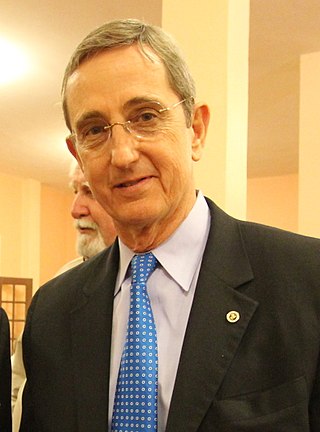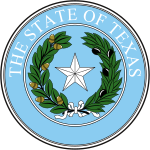
The governor of Texas is the head of government of the U.S. state of Texas. The governor is the head of the executive branch of the government of Texas and is the commander-in-chief of the Texas Military Forces.

Elections to choose members of the North Carolina Council of State were held on Tuesday, November 2, 2004. The U.S. Presidential election, U.S. House election, U.S. Senate election, the North Carolina General Assembly election, and North Carolina judicial elections were all held on the same day.

The lieutenant governor of Texas is the second-highest executive office in the government of Texas, a state in the U.S. It is the second most powerful post in Texas government because its occupant controls the work of the Texas Senate and controls the budgeting process as a leader of the Legislative Budget Board.

William Pettus Hobby was an American politician, journalist, and publisher. He was the publisher/owner of the Beaumont Enterprise when he entered politics and the Democratic Party. Elected in 1914 as Lieutenant Governor of Texas, in 1917 he succeeded to become 27th Governor of the U.S. state of Texas, after James Edward "Pa" Ferguson was impeached and forced to resign. In 1918, Hobby won the office in his own right, serving a full term.

Robert Douglas Bullock was an American attorney and Democratic politician from Texas, whose career spanned four decades. His service culminated in his term as the 38th Lieutenant Governor of Texas from January 15, 1991, to January 19, 1999, during the term of Governor Ann Richards and the first term of Governor George W. Bush. Bullock is among the last Democrats to win and/or hold statewide office in Texas.

Jerry Emmett Patterson is an American politician who served as the commissioner of the Texas General Land Office from 2003 to 2015. A former state senator, he was the second Republican since Reconstruction to serve as land commissioner, a post which he held for three terms. He served from the Houston area in District 11 in the Texas Senate from 1993 to 1999.

William Pettus Hobby Jr. is an American Democratic politician who served a record eighteen years as the 37th Lieutenant Governor of Texas. He held that office from January 16, 1973, to January 15, 1991, for an unprecedented five terms; he was the last lieutenant governor to serve a two-year term and the first elected to a four-year term when the Texas Constitution was amended to lengthen terms for statewide elected officeholders to four years beginning with the 1974 elections. The principal duty of the Texas lieutenant governor is to preside over the Texas State Senate.

Elections in Florida are held on the first Tuesday after the first Monday of November in even-numbered years, as provided for in Article 6 of the Florida Constitution. For state elections, the Governor of Florida, Lieutenant Governor, and the members of the Florida Cabinet, and members of the Florida Senate are elected every four years; members of the Florida House of Representatives are elected every two years.

The 2014 Wisconsin Fall General Election was held in the U.S. state of Wisconsin on November 4, 2014. Wisconsin's Governor, Lieutenant Governor, Attorney General, Secretary of State, and State Treasurer were all up for election, as well as Wisconsin's eight seats in the United States House of Representatives. The November general election in 2014 also featured a statewide referendum on an amendment to the Constitution of Wisconsin. The 2014 Wisconsin Fall Primary Election was held on August 12, 2014.

The 1962 Texas gubernatorial election was held on November 6, 1962, to elect the governor of Texas. Incumbent Democratic governor Price Daniel was running for reelection to a fourth term, but was defeated in the primary by John Connally. Although Connally was easily elected, Republican Jack Cox's 46% of the vote was the highest received by any Republican candidate for governor since George C. Butte in 1924.

United States gubernatorial elections were held on November 8, 2022, in 36 states and three territories. As most governors serve four-year terms, the last regular gubernatorial elections for all but two of the seats took place in 2018. The gubernatorial elections took place concurrently with several other federal, state, and local elections, as part of the 2022 midterm elections.

Two United States Senate elections were held in Illinois on March 26, 1913. The two elections were interconnected through a compromise made to elect a Democrat in the regular election and a Republican in the special election.
Democrat William Proxmire won a special election to fill the vacancy created by the death of Senator Joseph R. McCarthy (R-WI). Also, Price Daniel (D-TX) left the Senate to become governor of Texas, and Democrat Ralph Yarborough won a special election for that Senate seat. The Democrats thus made a net gain of one seat. However, Congress was out of session at the time of the Democratic gain in Wisconsin, and the Republicans gained a Democratic-held seat only weeks after the next session started, when Republican John D. Hoblitzell Jr. was appointed to fill the vacancy created by the death of Senator Matthew M. Neely (D-WV).

The North Carolina Council of State elections of 2020 were held on November 3, 2020, to select the ten officers of the North Carolina Council of State. These elections coincided with the presidential election, elections to the House of Representatives, elections to the Senate and elections to the North Carolina General Assembly and top state courts. Primary elections were held on March 3, 2020, for offices for which more than one candidate filed per party.

United States gubernatorial elections were held on November 5, 2024, in 11 states and two territories. The previous gubernatorial elections for this group of states took place in 2020, except in New Hampshire and Vermont, where governors only serve two-year terms and elected their governors in 2022. In addition to state gubernatorial elections, the territories of American Samoa and Puerto Rico held elections for their governors. This was also the first time since 1988 that a Republican nominee won the gubernatorial election in American Samoa and also the first time since 1996 that an incumbent governor there lost re-election.

The 2022 Nevada lieutenant gubernatorial election occurred on November 8, 2022, to elect the lieutenant governor of the state of Nevada. The election coincided with various other federal and state elections, including for Governor of Nevada. Primary elections were held on June 14. Nevada is one of 21 states that elects its lieutenant governor separately from its governor.

The Texas lieutenant gubernatorial election was held on November 6, 1990, to elect the Lieutenant Governor of Texas. Incumbent Comptroller Bob Bullock was elected over Republican Robert Mosbacher Jr. Bullock's term as Comptroller was complicated, despite his public drinking problem and proneness to outbursts he was popular because of his record that included large settlements that benefited the state and its citizens. Mosbacher had previously run for public office in 1984 when he ran in the Republican Primary for Texas' Senate seat. Since 1986 he had been CEO of his families Energy company, Mosbacher Energy.

The Texas lieutenant gubernatorial election was held on November 4, 1986, to elect the Lieutenant Governor of Texas. The Incumbent, William P. Hobby Jr. ran for re-election to his fifth and final term, he was elected against Republican and former minister, David Davidson. During the campaign Davidson attacked Hobby's support of the tax increases passed by the Legislature in 1984, Hobby countered that the taxes supported services that helped citizens of the state. Despite 1986 seeing former Republican Governor Bill Clements defeat Mark White by 6 points in the concurrent governor race, Hobby won the election in a landslide over Davidson. by the end of his term Hobby became the longest serving Lieutenant Governor in Texas history.

The 1982 Texas lieutenant gubernatorial election was held on November 2, 1982, to elect the Lieutenant Governor of Texas. The Incumbent, William P. Hobby Jr. ran for re-election to his fourth term, he was elected against Republican and former Secretary of State of Texas, George Strake Jr. During the campaign Strake ran a weekly series of newspaper ads called "Strake Talk" in which he would discuss current issues with the readers and hoped to generate public interest in the issues he discussed. Hobby ultimately won the election with 58% of the vote to Strake's 40%, and was sworn in on January 18, 1983.

The 1978 Texas lieutenant gubernatorial election was held on November 7, 1978, to elect the lieutenant governor of Texas. The incumbent, William P. Hobby Jr. ran for re-election to his third term, he was elected against Republican, Gaylord Marshall, whom he had beaten four years earlier. Hobby won the election with 65% of the vote to Marshall's 34%, and was sworn in on January 15, 1979, alongside Texas' first Republican governor since Reconstruction, Bill Clements who had won the concurrent gubernatorial election.




















